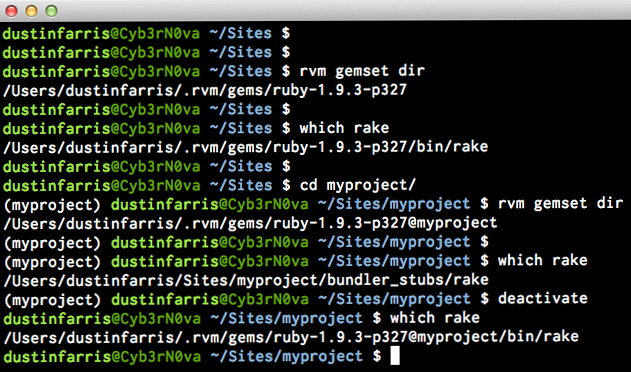.rvmrc and binstubs
A while ago I wrote a script to help manage gemsets and PATH settings when switching between Ruby projects. It has worked very well, but I’ve recently learned about .rvmrc — yes, I’m still new at this.
Most RoR programmers probably know that one must prefix console commands with bundle exec to ensure the correct binaries are used for the project you are working on. Something like:
bundle exec rake db:test:prepare
Most RoR programmers also probably know that you can “stub” out these binaries into a project directory by installing your gems with:
bundle install --binstubs=./bundler_stubs
So, the objective is to get the bundler_stubs directory on your system path whenever you are working on the project (and off your path when you leave it).
The .rvmrc file goes in your project’s root directory and it is automatically sourced in the background when you enter the directory. There is also an optional .rvmrc file in your home directory that gets called whenever you leave your project’s root directory — or enter any other non-.rvmrc-containing directory for that matter. The .rvmrc file is simply a bash script, so without further ado, here is an .rvmrc file for your project that will switch to a project-specific gemset and place the project’s bundler_stubs directory on your path. You only need to edit the top line:
rvm --create ruby-1.9.3-p327@projectname deactivate() if [ -n "$_OLD_VIRTUAL_PATH" ] ; then PATH="$_OLD_VIRTUAL_PATH" export PATH unset _OLD_VIRTUAL_PATH fi if [ -n "$_OLD_VIRTUAL_PS1" ] ; then PS1="#_OLD_VIRTUAL_PS1" export PS1 unset _OLD_VIRTUAL_PS1 fi unset _RUBY_PROJECT_DIR if [ ! "$1" = "nondestructive" ] ; then unset -f deactivate fi } # unset irrelevant variables deactivate nondestructive _RUBY_PROJECT_DIR="`pwd`" export _RUBY_PROJECT_DIR _OLD_VIRTUAL_PATH="$PATH" PATH="$_RUBY_PROJECT_DIR/bundler_stubs:$PATH" export PATH _OLD_VIRTUAL_PS1="$PS1" if [ "x" != x ] ; then PS1="$PS1" else PS1="(`basename \"$_RUBY_PROJECT_DIR\"`) $PS1" fi
This gives the ability to move in and out of your project’s directory and your gemsets and PATH are managed seamlessly:

